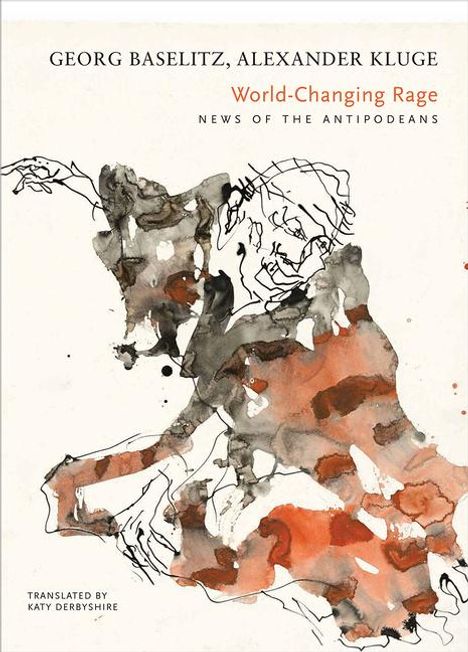Georg Baselitz: World-Changing Rage, Gebunden
World-Changing Rage
- News of the Antipodeans
(soweit verfügbar beim Lieferanten)
- Übersetzung:
- Katy Derbyshire
- Verlag:
- Seagull Books, 05/2019
- Einband:
- Gebunden
- Sprache:
- Englisch
- ISBN-13:
- 9780857426574
- Artikelnummer:
- 8840001
- Umfang:
- 240 Seiten
- Gewicht:
- 531 g
- Maße:
- 205 x 148 mm
- Stärke:
- 25 mm
- Erscheinungstermin:
- 15.5.2019
- Hinweis
-
Achtung: Artikel ist nicht in deutscher Sprache!
Weitere Ausgaben von World-Changing Rage |
Preis |
|---|
Klappentext
Rage and obstinacy are close relatives--and fundamental categories in the work of both Georg Baselitz and Alexander Kluge. In World-Changing Rage, these two accomplished German creators explore links and fractures between two cultures through two media: ink and watercolour on paper, and the written word. The long history of humankind is also a history of rage, fury, wrath. In this book, Baselitz and Kluge explore the dynamism of rage and its potential to rapidly grow and erupt into blazing protests, revolution, and war. The authors also reflect the melancholy archetype of the Western hero (and his deconstruction) against the very different heroic ethos of the Japanese antipodes. More powerful than rage, they argue, is wit, as displayed in the work of Japanese master painter Katsushika Hokusai. In this volume, Baselitz repeatedly draws an image of Hokusai, depicting him with an outstretched finger, as if pointing towards Europe in a mixture of rage, wrath, irony and laughter, all-too-fleetingly evident in his expression. A unique collaboration between two of the world's leading intellectuals, World-Changing Rage will leave every reader with a deeper appreciation of the human condition.
Biografie (Georg Baselitz)
Georg Baselitz, geb. 1938, ist ein bekannter Maler und Bildhauer. Sein Frühwerk zeichnet sich durch eine provokative, schroffe Figürlichkeit aus. Seit 1969 erfolgte Kehrtwendung der Bildmotive. Seit Mitte der 70er Jahre ist Georg Baselitz leidenschaftlicher Afrika-Sammler.Biografie (Alexander Kluge)
Alexander Kluge, geboren 1932 in Halberstadt, studierte in Marburg und Frankfurt/Main Rechtswissenschaften, Geschichte und Kirchenmusik. Nach seiner Zulassung als Rechtsanwalt absolvierte er ein Volontariat bei dem Filmregisseur Fritz Lang und betätigte sich mit Erfolg als Filmemacher und literarischer Autor. Er erhielt zahlreiche Preise. So wurde Alexander Kluge 2003 der "Georg-Büchner-Preis" verliehen und 2014 der "Heine-Preis" der Landeshauptstadt Düsseldorf. "... Als wichtiger Vertreter der kritischen Theorie knüpft er an das poetische, publizistische und politische Schaffen Heinrich Heines an", so die Jury.
